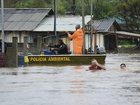Climate change is sparking human rights emergencies in numerous countries, the U.N. rights chief said Monday, stressing the need to fight the impunity of those who "plunder our environment."
 Full Story
Full Story
The number of confirmed deaths from recent flooding in central Greece rose to 15 after the bodies of four people previously considered missing were found on Sunday, authorities said.
Three of the bodies were located in villages near the city of Karditsa in western Thessaly. They are an 88-year-old woman and her 65-year-old son, who were found in their home, as well as a 58-year-old man whose body was found between two villages.
 Full Story
Full Story
At least 20 people were reported dead Monday in eastern Libya after the Mediterranean storm Daniel caused devastating floods over the weekend in different parts of the North African nation. Authorities declared at least one city a disaster zone.
The dead included 12 people in the eastern town of Bayda, the town's main medical center said. Another seven people were reported dead in the coastal town of Susa in northeastern Libya, according to the Ambulance and Emergency Authority.
 Full Story
Full Story
Severe rainstorms eased but floodwaters were still rising in parts of central Greece Friday, while fire department and military helicopters were plucking people from villages inundated by tons of water and mud that have left at least six dead, six missing and many people clinging to the roofs of their homes.
Flooding triggered by rainstorms also hit neighboring Bulgaria and Turkey, killing a total of 18 people in all three countries since the rains began Tuesday.
 Full Story
Full Story
Heavy rain in Hong Kong and southern China overnight flooded city streets and some subway stations, with hundreds evacuated and two deaths reported in Hong Kong.
Hong Kong authorities said during a joint news conference Friday that the extreme weather was expected to last until at least midnight, with widespread flooding and heavy disruptions to public transport in multiple districts.
 Full Story
Full Story
Hurricane Lee whirled through open waters on Thursday as forecasters warned it could become the first Category 5 storm of the Atlantic season.
Lee was not expected to make landfall while on a projected path that will take it near the northeast Caribbean, although forecasters said tropical storm conditions are possible on some islands. Meteorologists said it was too early to provide details on potential rainfall and wind gusts.
 Full Story
Full Story
Flooding from a cyclone in southern Brazil washed away houses, trapped motorists in vehicles and swamped streets in several cities, killing at least 31 people and leaving 2,300 homeless, authorities said Wednesday.
More than 60 cities have been battered since Monday night by the storm, which has been Rio Grande do Sul state's deadliest, Gov. Eduardo Leite said.
 Full Story
Full Story
The death toll from severe rainstorms that lashed parts of Greece, Turkey and Bulgaria has increased to 14 after rescue teams in the three neighboring countries recovered seven more bodies.
A flash flood at a campsite in northwestern Turkey near the border with Bulgaria killed at least five people — with three found dead on Wednesday — and carried away bungalow homes. Rescuers were still searching for one person reported missing at the campsite.
 Full Story
Full Story
Tennis has a fuzzy yellow problem most players don't think about when they open can after can of fresh balls, or when umpires at U.S. Open matches make their frequent requests for "new balls please."
Because tennis balls are extremely hard to recycle and the industry has yet to develop a ball to make that easier, nearly all of the 330 million balls made worldwide each year eventually get chucked in the garbage, with most ending up in landfills, where they can take more than 400 years to decompose. It's a situation highlighted by Grand Slam events like Flushing Meadows, which will go through nearly 100,000 balls over the course of the tournament.
 Full Story
Full Story
The first African Climate Summit ended with a call Wednesday for world leaders to rally behind a global carbon tax on fossil fuels, aviation and maritime transport, and it seeks reform of the world financial system that forces African nations to pay more to borrow money.
The declaration backed by the leaders of the continent of 1.3 billion people — a population set to double by 2050 — calls on the world's biggest emitters of planet-warming greenhouse gases and its richest countries to keep their promises. It notes especially the unfulfilled pledge of $100 billion annually to developing nations in climate finance, made 14 years ago.
 Full Story
Full Story



